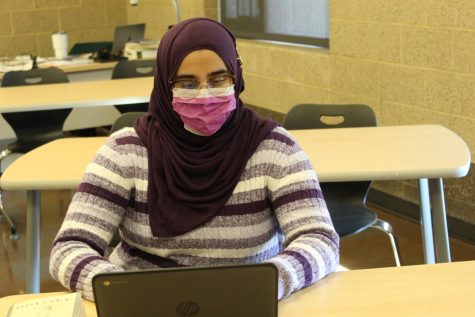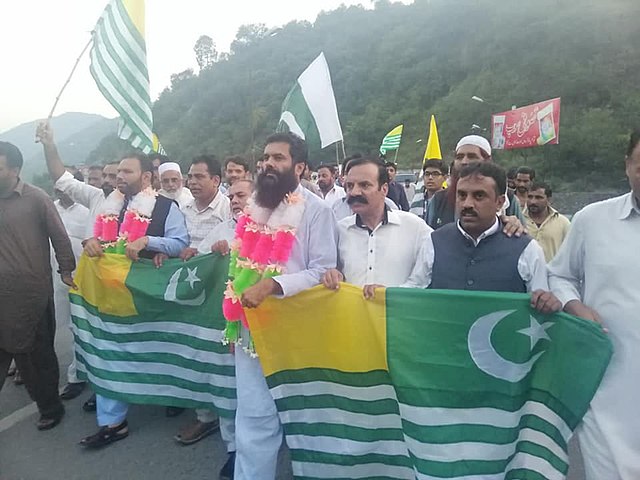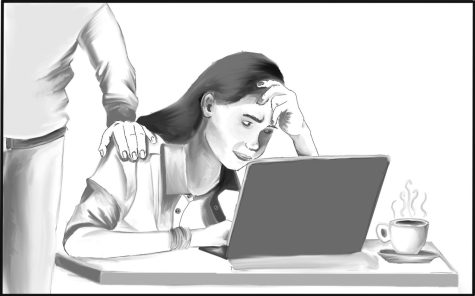Oppression Continues in Kashmir
Colonel Sardar Ilyas via WikimediaCommons
Kashmiris march for freedom in Dec. 2019.
The story of Russia’s invasion of Ukraine has been widely reported in recent months. But unfortunately, Ukraine is not the only place in the world where civilians are being subject to military occupation and violations of their human rights.
In 2018, the Beachcomber covered the genocide in Kashmir. Despite four years passing and a global pandemic, not much has changed.
The current crisis in Kashmir can be traced back 75 years, to the partition of Pakistan and India in 1947. The two countries were populated by people of different religions, and Muslims wanted to separate due to Islamophobic and violent actions taken by Hindus and Sikhs. It was also a separation from Great Britain, which had colonized the land for the preceding century.
Kashmir became a contested land because there was a Muslim majority, and the agreement was that those territories would decide for themselves whether to be a part of Pakistan or India. However, due to their being a Sikh ruler, the land of Kashmir was disputed. Eventually, the United Nations decided to table the issue and settle it at a later date.
Later never came.
Even though Great Britain and the United Nations decided to preserve the demographics in the region, new people who moved in wouldn’t be considered citizens though Article 370, not much else was done to resolve the issue.
And then in 2018, India tried to find a loophole by declaring a national emergency, which enabled them to let others move in. The Indian army also moved in and placed Muslims under lockdown, keeping medicine, education and even newspapers and the Red Cross out of reach. It was an outrageous act disregarding the Human Rights of Muslim Kashmiris, but the world did nothing and not much changed.
In recent years, the Indian Army has used a legal technicality to justify murdering citizens.
The Armed Forces Special Powers Act is meant to limit local authorities by placing them under the jurisdiction of India since they’d have to first have permission from New Delhi before investigating any human rights violations by Indian soldiers.
The Indian government has essentially enabled soldiers to act without fear of repercussion, including searching, arresting and killing citizens.
One such incident is that of Abrar Chouhan, a 25-year-old Kashmiri man who went to work as a seasonal laborer in order to support his family, so that they could finish their house’s construction and also pay for their son’s education. However, he was brutally murdered, along with two other men, by the Indian army, under claims that they were Pakistani militants.
However, the men had no affiliation to Pakistani militants.
Kashmir’s local authorities also uncovered a practice of the Indian Army offering bounties and job promotions for soldiers who kill militants and that, in some cases, civilians have been falsely targeted by Indian soldiers.
“In the orchard killings, two civilian ‘informers’ and an Indian army officer are accused of staging the entire incident to collect a bounty equivalent to $27,000 (€23,000),” reported the Newspaper Deutche Welle. “Police said army officer Captain Bhoopendra Singh ‘furnished false information to mislead senior officers into granting the reward, in furtherance of a criminal conspiracy.’”
However, the Armed Forces Public Safety Act allowed those involved in the killing to go unpunished.
“Initially, we had hoped for justice. But when the case was transferred to a military court, we realized that it will just be another number on a long list of killings in fabricated encounters by the Indian Army in Kashmir. There won’t be any justice,” said Shireen Akhter, widow of Chouhan.
Journalists are also being targeted in the territory.
One journalist, Aasif Sultan, was imprisoned for four years, and when he was finally released on bail, he was arrested again on similar charges.
Fahad Shah, editor in chief of Kashmir Walla, was arrested four times, being charged again after every time he was given bail.
Many have been arrested because of the Public Safety Act, which is purported to be an antiterrorism law, but which allows Indian authorities use to arrest someone when they perceive a possibility they ‘may do something illegal’. The Unlawful Activities Act also caused arrests of reporters along with poets and activists.
According to Genocide Watch, Kashmir is under Genocide Emergency, and India, as a whole, is under Genocide Emergency for the killing of Muslims.
In fact, the current Indian government, the Bharatiya Janata Party led by Prime Minister Narendra Modi, has been very Islamaphobic, BJP President Amit Shah even calling Muslims termites.
“The president of India’s ruling party crosses a disturbing and well-known line,” European media director of Human Rights Watch Andrew Strohlein Tweeted and was latter quoted in The Print. “The path to genocide and other mass atrocity crimes is always 1st paved by powerful politicians using dehumanising language of ‘termintes’, ‘cockroaches’ or ‘vermin’.”
Muslims have also been targeted through arrests: a Muslim boy who walked a Hindu girl home, a Muslim man who married a Hindu woman, Kashmiri Muslims celebrating Pakistan’s win over India in a Cricket Match, are among only a few cases of police brutality in India against Muslims.
Amnesty International and Genocide Watch have warned that Modi’s actions are leading to a genocidal massacre. On the other hand, Modi has been given numerous awards by countries, including the Legion of Merit Award by the United States.
“According to research from the US Holocaust Memorial Museum, India is at a high risk – number two in the world – for a genocide… We call on all of you to recognize that the hatred being expressed in India is at a very serious level. We can’t let the Biden Administration repeat the mistakes of the past,” said Sunita Viswanath, Executive Director of Hindus for Human Rights in an article with the Milli Gazette.

Hiba Z. Ali began writing for the Beachcomber in fall of 2019. She covers diversity in the school. In addition to writing for the Beachcomber, she also...













